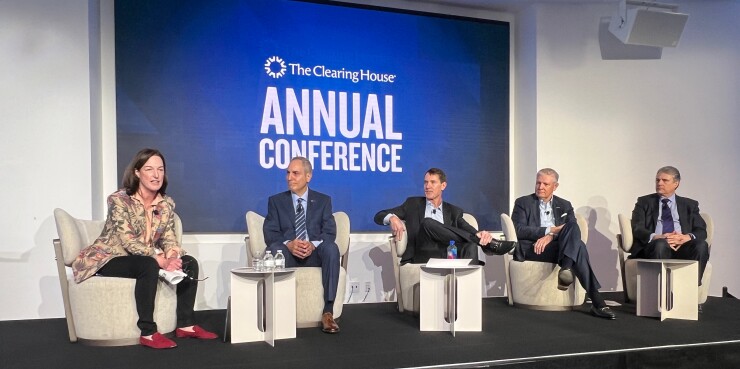
The chief executives of several regional banks say they're reluctant to fully embrace real-time payments just yet.
Fraud risks, regulatory uncertainties and the monumental task of implementing real-time payment systems that can instantaneously transfer funds throughout the U.S. financial system and around the world are leading them to take a go-slow approach, the CEOs said on Thursday at an industry event hosted by The Clearing House in New York.
The ability to process transactions in real time would make a banking company more appealing to customers, but banks need "clear rules of the road" about how to confront fraud and handle reimbursements, according to Andy Cecere, CEO of Minneapolis-based U.S. Bancorp.
"Fraud is real time," Cecere said. "Processes for reimbursement are in real time. [Rules for] all of those things need to be very clear."
Regulations should apply to all payments players, not just banks, he argued.
"I am more concerned about tech platforms who are getting into banking via the payments mechanism, and doing all the things that a bank does, but not being as regulated as a bank," Cecere said.
PNC Financial Services CEO Bill Demchak said that the Pittsburgh bank is "struggling with use cases" for real-time payments.
"All else equal," he said, "getting from here to there when the old system isn't so bad is a big challenge."
There are also some "small problems in the moment for people" related to the implementation of real-time payments, including the "exponential growth" in fraud that's hit the U.S. banking industry over the last three years, Demchak said.
"Real time is trying to speed up. All of the stuff related to fraud and scams are slowing it down," he said. "Everybody is getting attacked and scammed and defrauded … I'll wait a day so that doesn't happen to me."
To be sure, Europe offers a "prime example" of how the adoption of real-time payments can help solve the "complexity" of interconnecting new payment systems across disparate banking markets, according to Michael Roberts, CEO of HSBC US.
HSBC US is planning to invest more in technology that enables instant payments including artificial intelligence, Roberts added. But it's "unfortunate," he said, that a lot of the bank's recent expenses have been "regulatorily driven," he said.
One challenge the U.S. banking sector faces in adopting a real-time payments system is getting banks of all sizes and across regional markets to invest in the proper technology, according to Curtis Farmer, CEO of Dallas-based Comerica.
"For us, it's really the demand associated with it," Farmer said. "We have not quite convinced the commercial markets that there's enough demand" to move quickly towards instant payments, he added.
"Longer term, this is probably the right solution," Farmer said. "But we may be a little bit ahead of our time in building the demand for it."






